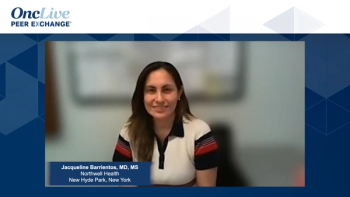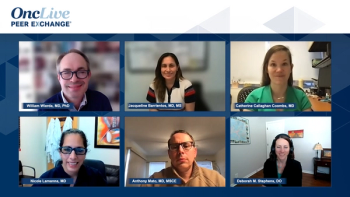
A panel of expert oncologists offer closing thoughts on the future treatment landscape and unmet needs in CLL.

Your AI-Trained Oncology Knowledge Connection!


A panel of expert oncologists offer closing thoughts on the future treatment landscape and unmet needs in CLL.

Expert oncologists explore emerging therapies being investigated in CLL, including BTKi degraders, CAR-T therapy, and bispecific antibodies, and discussed their potential impact in shaping the future of CLL treatment.

The expert panel discusses recent data regarding the mechanisms of resistance to non-covalent BTK inhibitors in CLL.

Jacqueline Barrientos, MD, MS, discusses the role of non-covalent BTK inhibitors in R/R CLL and provided concise comments on the latest data, including insights from the ongoing BRUIN and Bellwave trials.

Javier Pinilla, MD, PhD explores evidence on molecular mechanisms leading to resistance in second-generation BTK inhibitors for CLL, providing insights from recently presented data at ASH 2023.

A panel of expert oncologists explore the influence of hypertension risk and other cardiovascular AEs in guiding treatment selection with BTKis, sharing insights from ASH 2023.

Faculty provide insights into the selection of BTK inhibitors, emphasizing the role of efficacy, toxicity, and quality of life data in treatment decisions, and exploring the impact of MAIC data.

Panel experts examine considerations for BTKi-based strategies in R/R CLL, highlighting pivotal findings from head-to-head trials, including acalabrutinib vs ibrutinib in ELEVATE-RR and zanubrutinib vs ibrutinib in ALPINE, covering safety, quality of life, and extended follow-up data.

Faculty share insights into the overall strategy for managing relapsed/refractory CLL following first-line therapy with venetoclax-based regimens and BTK inhibitors, discussing strategy variations based on prior first-line treatments.

Experts explore the role of BTKi-based combination therapy in the front-line treatment of CLL, focusing on patient considerations and referencing key data from CAPTIVATE, FLAIR, MAJIC, and SEQUOIA (Arm D).

Javier Pinilla, MD, PhD, provides a brief overview of the changing CLL treatment landscape, discussing the influence of off-target adverse events and the development of treatment resistance on the evolution of BTK inhibitor therapy.

Joanna Rhodes, MD, MSCE, explores the general approach to treatment-naïve CLL patients with high-risk factors such as del17p and TP53 mutations.

Brian Hill, MD, PhD, discusses the use of BTK inhibitor monotherapy in CLL and presented recent long-term data updates from studies such as the 6-year follow-up of ELEVATE-TN and the extended follow-up from SEQUOIA.

Catherine Coombs, MD discusses the present CLL front-line treatment landscape, addressing considerations like choosing fixed-duration or continuous therapy and variations in first-line approaches based on age and ECOG status.

A comparison of 3 PI3K inhibitors—idelalisib, duvelisib, and umbralisib—as treatment for chronic lymphocytic leukemia.

What to know in terms of COVID-19 vaccine responses in patients with chronic lymphocytic leukemia on novel targeted therapies.

Key takeaways of the CLL13 (GAIA) clinical trial based on highlights presented at ASH 2021.

Considerations for treating patients with relapsed/refractory chronic lymphocytic leukemia with the combination of ibrutinib and venetoclax.

Variables that impact which Bruton tyrosine kinase inhibitor is most appropriate as frontline therapy for patients with newly diagnosed chronic lymphocytic leukemia and the role of patient and disease factors in treatment selection.

Reactions to longer-term follow-up data presented in 2021 on the use of ibrutinib as frontline treatment for patients with chronic lymphocytic leukemia.

The rationale for using Bruton tyrosine kinase inhibitors, such as the first-generation option, ibrutinib, as first-line treatment for chronic lymphocytic leukemia.